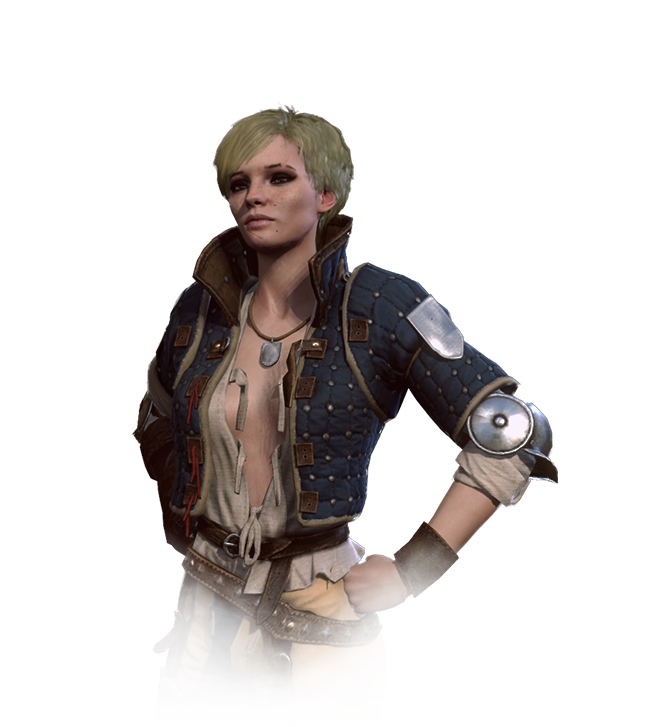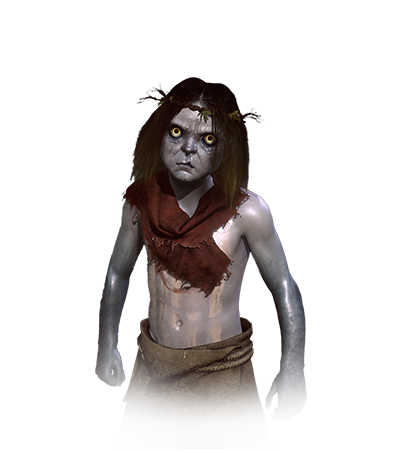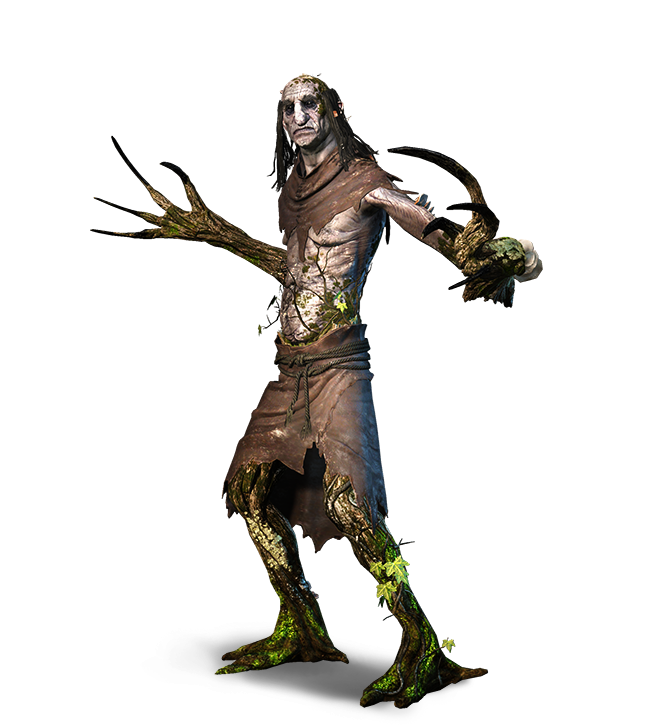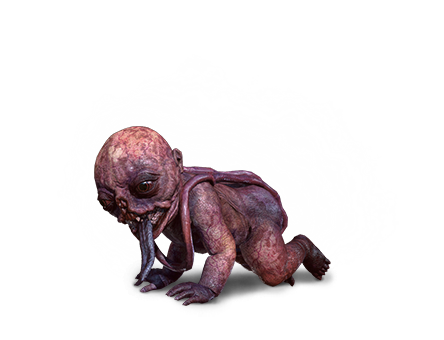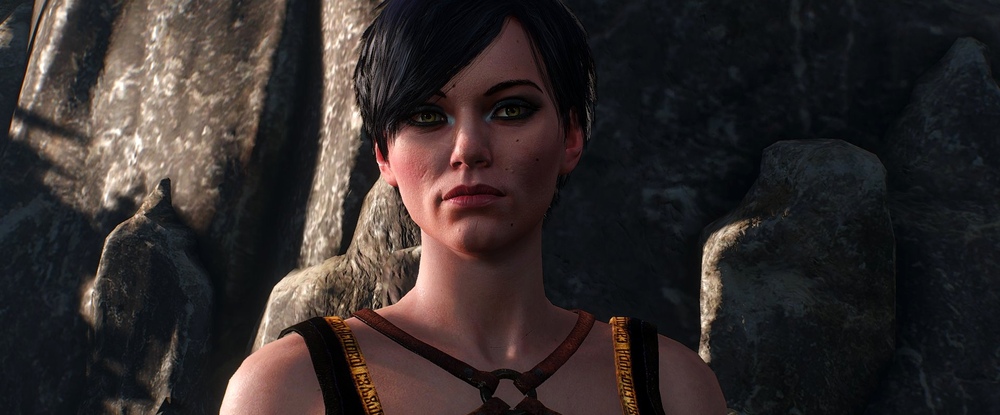"The Witcher 3: Wild Hunt": how localizers translated names and titles
Today we have a gaming theme again. Let's talk about the game "The Witcher 3: Wild Hunt." The game itself is excellent, one of the best in its genre. She has collected many awards and millions of enthusiastic fans.
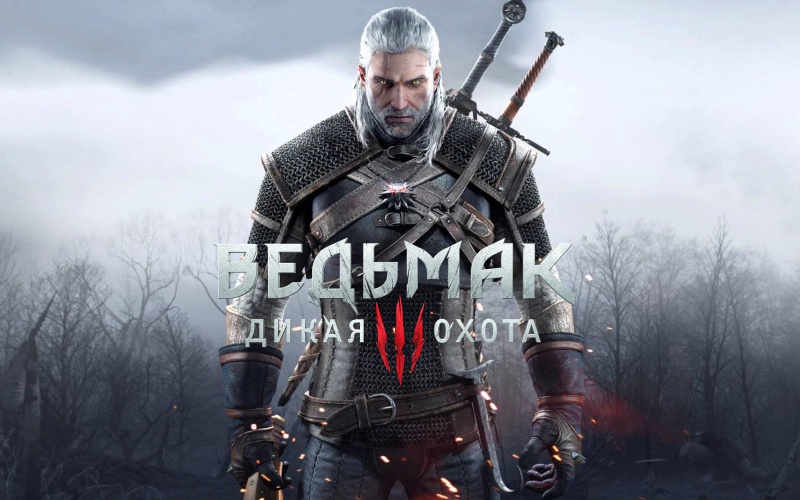
But let's talk not about the game itself, but about its localizations. And more specifically, how the names of the characters and various names in the game world were translated in different localizations. Ready? Then move, Roach!
')
Adaptation of names and names is an important part of the localization of the game world. Especially as huge as the Witcher. The difficulty is that some names can be "talking" and more deeply reveal the character of the characters, and the names of monsters, for example, can differ greatly in the mythologies of different countries.
Interestingly, the world of the third "The Witcher" is many times wider than even in the original works of Andrzej Sapkowski.
In total, the game has more than 1200 names, names of monsters, equipment items and the surrounding world. And many of them have no direct analogs in different languages, so localizers had to be quite tight.
Now a little more tediousness - and immediately move on to the most interesting.
When localizing names and titles, two groups of translation techniques are used:
The first way is simpler, but the second is more interesting. We will disassemble both.
We will compare the English and Russian localization with links to the Polish original book (if available). In a couple of cases we mention the German versions of words.
Let's start with the names of the main characters. According to the unwritten rules of localizers, the names of the main characters are translated directly, with rare exceptions, if they contain a special subtext.


All these names were found in books, so the developers essentially copied the book correspondences, and the translators themselves used direct translation. Straight bored or something.
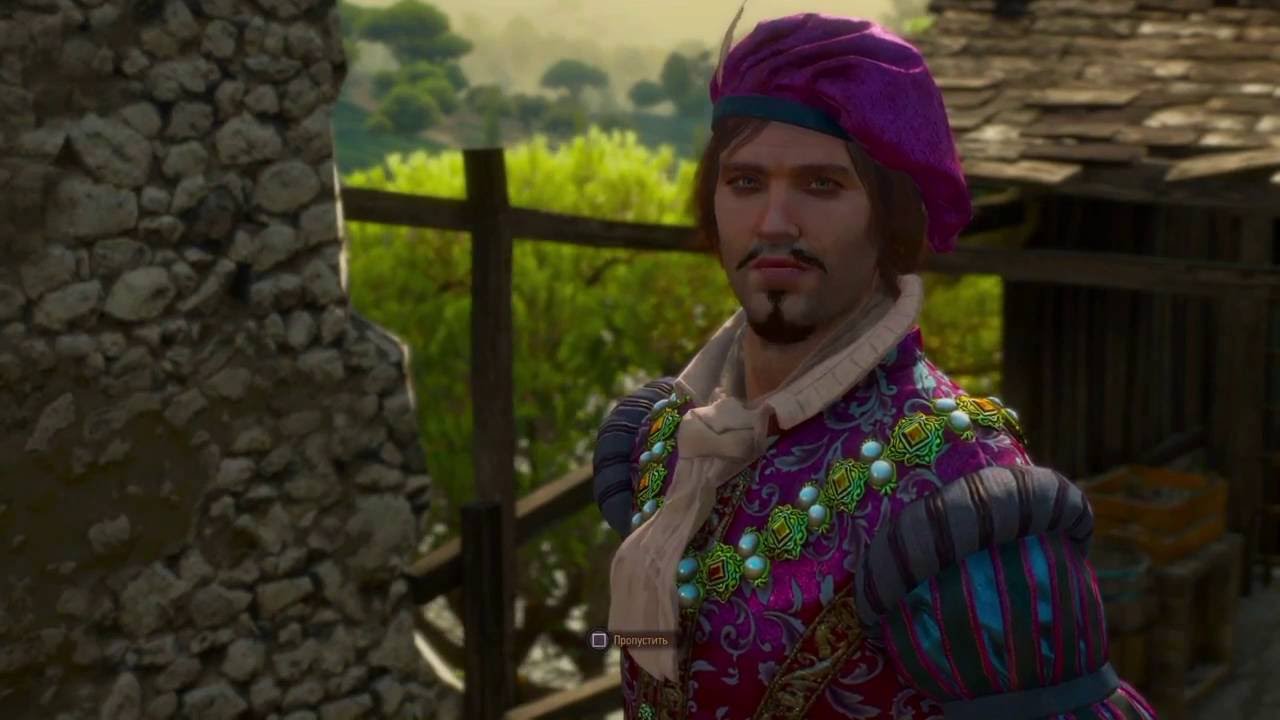
But on the name of the Bard Buttercup is worth a little more detail. Indeed, in the English version it is Dandelion (English dandelion), and in the German version it is Rittersporn (in German). All these transformations are also taken from books, so the creators of the game did not have any special options.
It is worth mentioning that in the Polish original of the book the bard was called Jaskier (pl. Buttercup). So the Russian version is the most accurate.
It is difficult to guess what exactly the translators were guided by, adapting the name in this way, but, to our opinion, all the options more or less accurately reflect the character of the bard.
Most names are translated using transcription, transliteration or tracing. And this is understandable - there is no need to invent a bicycle.
But there are exceptions. As examples, choose three minor characters.
For mythological creatures, most of whom are monsters from The Witcher, you need to find a match. Or, if it is not there, pass the name with preservation of meanings.
Especially difficult for the English localization seemed authentic characters and creatures from Slavic mythology. In some cases, there are almost complete correspondences that convey most of the meanings.
There was a discrepancy due to the peculiarities of different localizations. The names of the creatures from the first "The Witcher" were adapted to Russian from English, and there he was "Cockatrices". The third part was translated from Polish - there the creature is called "Kuroliszek".
The most interesting were the names of the monsters that were invented by Andrzej Sapkowski or the creators of the game.
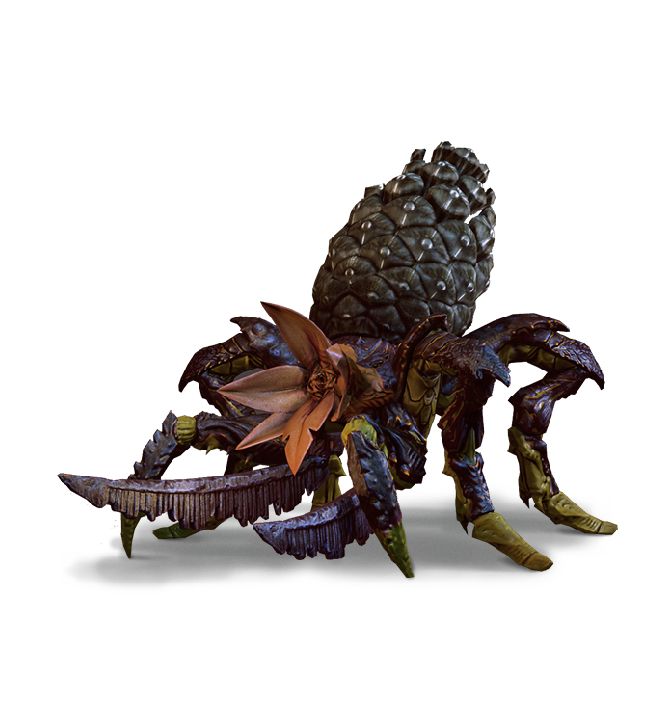
There is such a tvaryushka - armored head of eyes. In mythology, it does not occur, lives only in the universe "The Witcher". Translated it, apparently looking at the appearance. Indeed, in English, it became Arachasae (spider), and in German it became Krabbspinnen (Krabopauk).
In our opinion, the Russian version, although it does not refer to the appearance of the monster, but it is more harmonious than the English and German localizations.
Translation of titles of books and quests does not require high accuracy in the wording. The main thing is that he conveyed the meaning and style of the phrase.
For localizers, this is a simpler task than Igosha, but here too there are some peculiarities, because in quests and books there are many references to cross-links with the Witcher world and beyond.
In the German localization quest received a neutral name "Kleinrot".
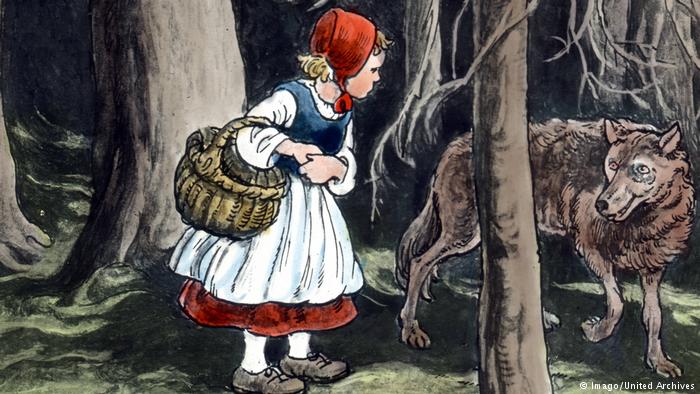
Sometimes localizers allowed too loose translation in quest names. The mission of "Dead Man's Party" in Russian suddenly became "And I was there, drinking honey and beer." Although both names are colorful in their own way.
But it is worth mentioning that all the same, most of the quests and book titles are translated directly, without using any transformations.
For example, books in elvish unexpectedly remained in elvish. Is that the name in different locations changed the articles. You can compare:
In some cases, localizers had to use a similar translation, which does not fully reflect the subtext. “Contract: Loosey this Goosey!” Was translated as “Order: Worried Goose.”
Loosey-goosey is a phraseological unit, which means “cheeky; one that does not meet social norms. " Apparently, it was simply not possible to keep the full meaning of the word game in the context of a short phrase.
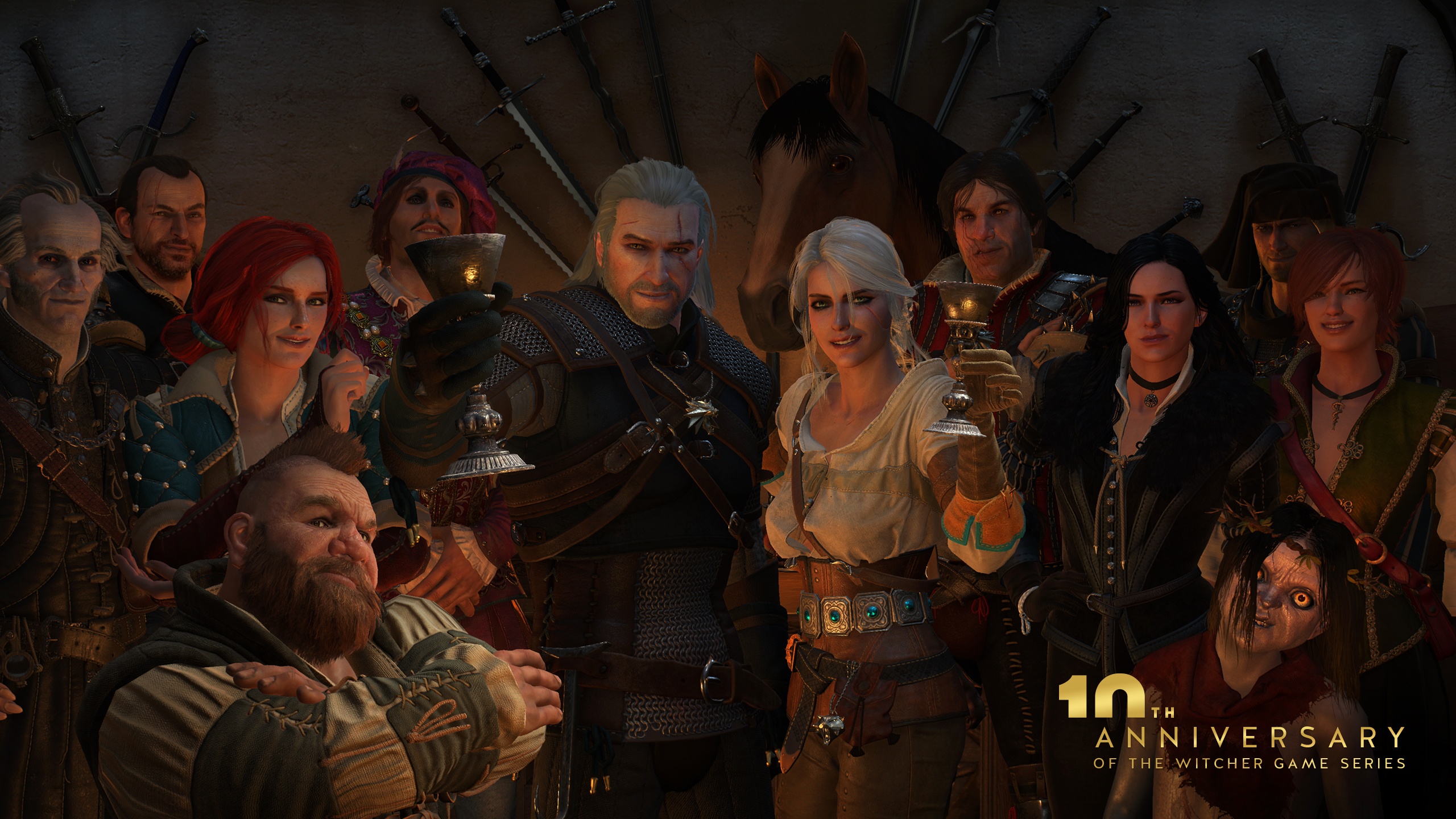
In general, localizers have done a great job. Dialogues alone for 200 hours of voice acting. And how much of the texts had to be translated, it is even scary to imagine.
And the result can be called great. The World "The Witcher" turned out bright, unusual, authentic, with its own secrets and jokes.
Play and enjoy whatever language you choose.
And finally, here's another masterpiece from Russian localizers - the monologue of the Bloody Baron:

→ Crank in English on online courses from EnglishDom.com
According to the link - 2 months of premium subscription for all courses as a gift.
→ For live communication - choose individual training via Skype with a teacher.
The first trial lesson is free, register here . The promo code goodhabr2 - 2 lessons as a gift when buying from 10 lessons. The bonus is valid until 05/31/19.

But let's talk not about the game itself, but about its localizations. And more specifically, how the names of the characters and various names in the game world were translated in different localizations. Ready? Then move, Roach!
')
So what's up with the localization of The Witcher?
Adaptation of names and names is an important part of the localization of the game world. Especially as huge as the Witcher. The difficulty is that some names can be "talking" and more deeply reveal the character of the characters, and the names of monsters, for example, can differ greatly in the mythologies of different countries.
Interestingly, the world of the third "The Witcher" is many times wider than even in the original works of Andrzej Sapkowski.
In total, the game has more than 1200 names, names of monsters, equipment items and the surrounding world. And many of them have no direct analogs in different languages, so localizers had to be quite tight.
Notable is even the origin of the word "Witcher".Russian and English versions of the game are quite different. The original is English localization. But the localizers of the Russian version widely used Polish as the source code - the original language of the books and the creators of the game, so in some places the translation more accurately conveys the meaning of the names and titles.
The author took it from Slavic mythology. But the meaning of this word was somewhat different. Witcher was called a man associated with the devil, who is capable of harming people, sending diseases, spoiling cattle and so on through his thoughts and actions. By the way, hidden references to the original meaning of the word are often given by villagers who speak with the main character.
But in Western mythology, even the equivalent of the word "Witcher" was not. “Witcher” is an artificially created name that in the western market is associated only with the game series, without mythological overtones.
That is why, with the release of the first game, the publishers had to further explain who the Witcher was, because the Sapkowski series of books had not yet gained worldwide popularity.
Now a little more tediousness - and immediately move on to the most interesting.
When localizing names and titles, two groups of translation techniques are used:
- Direct translation. This includes transcribing, transliteration, tracing, translation and searching for the full vocabulary equivalent. That is, the translation without any sub-subdivisions.
- Transforming translation. If the direct translation did not work, then the name is localized using various lexico-semantic replacements: specify, generalize, change components, remove or add them. And everything like that.
The first way is simpler, but the second is more interesting. We will disassemble both.
Analysis of the translation of names and titles in the world "The Witcher 3"
We will compare the English and Russian localization with links to the Polish original book (if available). In a couple of cases we mention the German versions of words.
Heroes and heroines
Let's start with the names of the main characters. According to the unwritten rules of localizers, the names of the main characters are translated directly, with rare exceptions, if they contain a special subtext.


All these names were found in books, so the developers essentially copied the book correspondences, and the translators themselves used direct translation. Straight bored or something.

But on the name of the Bard Buttercup is worth a little more detail. Indeed, in the English version it is Dandelion (English dandelion), and in the German version it is Rittersporn (in German). All these transformations are also taken from books, so the creators of the game did not have any special options.
It is worth mentioning that in the Polish original of the book the bard was called Jaskier (pl. Buttercup). So the Russian version is the most accurate.
It is difficult to guess what exactly the translators were guided by, adapting the name in this way, but, to our opinion, all the options more or less accurately reflect the character of the bard.
Most names are translated using transcription, transliteration or tracing. And this is understandable - there is no need to invent a bicycle.
But there are exceptions. As examples, choose three minor characters.
Bianca, the warrior of the Blue stripes and a pretty girl, whom the Witcher Geralt had the opportunity to get to know in the second part. But here is a surprise - in all other localizations it bears the name Wes (Ves). It is clear that in the third part of the franchise it was too late to change the name of the character, but why it is Bianca that remains a mystery.
Ivasik, pribozhek protecting the swamps. In the Polish original, his name was Janek, which is equivalent to Russian Ivan or English John. Localizers made a good decision to adapt the name - and “Ivasik” suits the creature perfectly, if you still consider that it looks like a child.
If with human names everything is clear, then with the names of monsters everything is difficult.
Witold von Everek, a nobleman. In English, he bears the name of Vlodimir, but when translated into Russian, localizers decided not to translate it directly. “Vladimir” sounds too simple and in Russian is still a very common name. Do not be like a nobleman. Therefore, "Vladimir" became "Vitold".
Monsters and creatures
For mythological creatures, most of whom are monsters from The Witcher, you need to find a match. Or, if it is not there, pass the name with preservation of meanings.
Especially difficult for the English localization seemed authentic characters and creatures from Slavic mythology. In some cases, there are almost complete correspondences that convey most of the meanings.
But so lucky only in rare cases. Most often, with the translation of unique creatures have to torment.
For example, boletus and spriggan. Borovik is a character of Slavic mythology, a younger spirit and a forest guard, subordinate to the devil. He is depicted as a humanoid, whose limbs are covered with bark and moss, and instead of fingers - tenacious branches.
Springs, in turn, have an absolutely similar description. Is that they add more and tree horns. But this character is already authentic Cornish mythology (a region in the south-west of England). That is, we have two almost identical mythological creatures from different mythologies. What a luck!
However, in adaptations happened and punctures. For example, kurolisk and kokatriks are two equivalent names of the same mythological monster. Only in the first part of the saga, he bore the name “Cockatrix” - the hunt for him was a quest from the main chain, so it was impossible to miss it, and in the third part of The Witcher he suddenly became a “kurolisk” who also had to be slaughtered quest. The developers of the kuolisks clearly dislike it.
In the line of quests with the Bloody Baron is Igosha - the monster from Slavic mythology, the spirit of a stillborn baby or child who died before baptism.
Approximately a similar creature is in Norse mythology - utburd. But in the specific case, no selection of analogs was suitable, because the quest series explained in detail the origin of the yagosha and the ways to remove the curse.
English localizers had to get out. "Igoshu" was replaced by "Botchling", which in Russian means "physically or mentally underdeveloped child." The word is quite rare and quite well conveys the meaning, even if not completely. Localizers got out - and quite decently.
There was a discrepancy due to the peculiarities of different localizations. The names of the creatures from the first "The Witcher" were adapted to Russian from English, and there he was "Cockatrices". The third part was translated from Polish - there the creature is called "Kuroliszek".
The most interesting were the names of the monsters that were invented by Andrzej Sapkowski or the creators of the game.

There is such a tvaryushka - armored head of eyes. In mythology, it does not occur, lives only in the universe "The Witcher". Translated it, apparently looking at the appearance. Indeed, in English, it became Arachasae (spider), and in German it became Krabbspinnen (Krabopauk).
In our opinion, the Russian version, although it does not refer to the appearance of the monster, but it is more harmonious than the English and German localizations.
Books and assignments
Translation of titles of books and quests does not require high accuracy in the wording. The main thing is that he conveyed the meaning and style of the phrase.
For localizers, this is a simpler task than Igosha, but here too there are some peculiarities, because in quests and books there are many references to cross-links with the Witcher world and beyond.
There are also inaccuracies. This time - in the German version. For some reason, in the “Little Red Riding Hood” mission, they could not trace the reference to the famous fairy tale. The joke is that the Grimm brothers, who recorded one of the most famous versions of the tale, were Germans.
For example, the name of the quest “Veni Vidi Vigo” was left without translation, because this is an obvious reference to the phrase of Julius Caesar “Veni Vidi Vici” (Came, saw, won) with the last word changed. Vigo in this context is the name of the character Fringigli Vigo.
Another example in the title of the quest "Something ends, something begins." Sapkowski has a story with the exact same title. I am glad that both Russians and English localizers understood this and used the book version of the translation of the phrase.
And one more example: the quest "Tristianna and Isidor", which quite clearly hints at the medieval work "Tristan and Isolde." All localizers also coped with this “task”.
In the German localization quest received a neutral name "Kleinrot".

Sometimes localizers allowed too loose translation in quest names. The mission of "Dead Man's Party" in Russian suddenly became "And I was there, drinking honey and beer." Although both names are colorful in their own way.
But it is worth mentioning that all the same, most of the quests and book titles are translated directly, without using any transformations.
For example, books in elvish unexpectedly remained in elvish. Is that the name in different locations changed the articles. You can compare:
- Russian - "Aen Seidhe and Aen Elle"
- English - "The Aen Seidhe and the Aen Elle"
- German - "Die Aen Seidhe und die Aen Elle"
In some cases, localizers had to use a similar translation, which does not fully reflect the subtext. “Contract: Loosey this Goosey!” Was translated as “Order: Worried Goose.”
Loosey-goosey is a phraseological unit, which means “cheeky; one that does not meet social norms. " Apparently, it was simply not possible to keep the full meaning of the word game in the context of a short phrase.
Also in the titles of books is often used the method of lexical imitation, when localizers try to convey local color through the name. For example, "Merry Adventures of Muriel, the Beautiful Nasty, funny engravings supplied" or "Letter to Cosmas to Cyril". This is already a solution to support the atmosphere - and it works great.***

In general, localizers have done a great job. Dialogues alone for 200 hours of voice acting. And how much of the texts had to be translated, it is even scary to imagine.
And the result can be called great. The World "The Witcher" turned out bright, unusual, authentic, with its own secrets and jokes.
Play and enjoy whatever language you choose.
And finally, here's another masterpiece from Russian localizers - the monologue of the Bloody Baron:
EnglishDom.com - online English learning platform

→ Crank in English on online courses from EnglishDom.com
According to the link - 2 months of premium subscription for all courses as a gift.
→ For live communication - choose individual training via Skype with a teacher.
The first trial lesson is free, register here . The promo code goodhabr2 - 2 lessons as a gift when buying from 10 lessons. The bonus is valid until 05/31/19.
Source: https://habr.com/ru/post/441290/
All Articles
